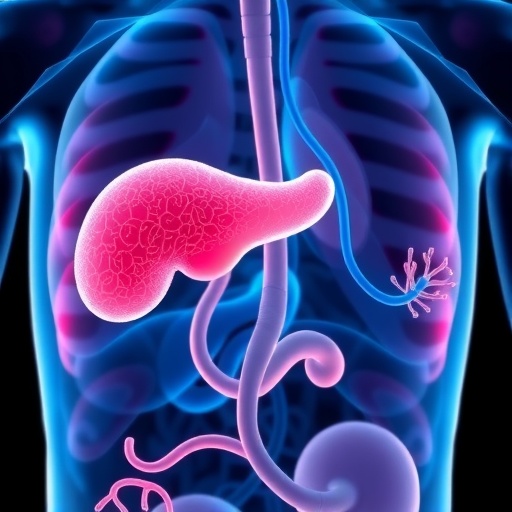PROTECT YOUR DNA WITH QUANTUM TECHNOLOGY
Orgo-Life the new way to the future Advertising by Adpathway
In a groundbreaking study published in Current Transplant Reports, researchers J.A. Fridell and R.J. Stratta explore a pressing issue in the field of organ transplantation: the expansion of the pancreas transplant recipient pool. With diabetes affecting millions worldwide, the need for innovative solutions to enhance the quality of life for those suffering from this chronic condition has never been more urgent. This article delves into the nuances of expanding the recipient pool, weighing the benefits against potential risks, and what this could mean for future transplantation practices.
The context of pancreas transplantation is critical. For individuals with type 1 diabetes, the complications stemming from the disease can be life-altering. Traditional management strategies often entail rigorous insulin regimens and constant monitoring of blood glucose levels, which can be burdensome. The allure of pancreas transplantation lies in its potential not only to regulate blood sugar levels effectively but also to eradicate the need for insulin altogether. However, as the authors highlight, this transition poses questions regarding the appropriateness of expanding the recipient criteria.
Fridell and Stratta meticulously analyze the current eligibility criteria for pancreas transplantation, taking into account factors such as age, comorbidities, and the presence of other diabetes-related complications. The existing protocols emphasize the importance of careful patient selection to ensure optimal outcomes. In their research, they argue that an expansion could render more patients eligible, but it must be approached with caution. The study outlines the fundamental ethical considerations essential in determining who qualifies for transplantation, navigating the delicate balance between hope and feasibility.
The implications of expanding the recipient pool are multifaceted. One significant benefit is the potential increase in the number of successful transplants, thereby alleviating the burden of waitlists that often leave patients in dire situations. This could lead to reduced morbidity and mortality rates associated with diabetes complications. Nonetheless, the authors stress that such expansions should not compromise the quality of transplant outcomes. Understanding the biological differences in recipient health is paramount when considering this expansion.
In addressing the medical community, Fridell and Stratta present case studies, illustrating circumstances where expanded criteria have yielded successful transplantation outcomes. These data points serve to fortify their argument for change, showcasing that with careful monitoring and an adaptive surgical approach, more individuals may benefit from pancreas transplants. However, they also caution against hasty amendments to eligibility criteria that don’t take into account the holistic health of potential recipients.
Emerging technologies play a pivotal role in this discussion. As transplant protocols evolve, innovations such as improved organ preservation methods and better immunosuppressive therapies may allow for safer and more effective transplants. The researchers highlight how advancements in these fields could support the safe expansion of the recipient pool, enabling broader access while still prioritizing patient safety and transplant efficacy.
An integral component of this research paper is its emphasis on post-transplant outcomes. The authors provide insights into the likely benefits and risks faced by patients who receive pancreas transplants under expanded criteria. They advocate for a comprehensive follow-up system to monitor patients closely, thus ensuring that any adverse effects can be managed swiftly. This focus on longitudinal patient assessment reflects a growing awareness of the long-term implications of transplant surgery.
Furthermore, Fridell and Stratta propose possible policy changes that could streamline the evaluation process for potential recipients. By re-evaluating existing frameworks governing eligibility, the medical community could modernize its approach to transplantation. This could involve incorporating a more personalized assessment that considers not just the clinical aspects but also the patient’s social, psychological, and financial circumstances.
Another vital aspect of their study is the involvement of transplant centers. The authors argue that these centers must be equipped with the necessary resources to handle increased applicant volumes, which may arise from an expanded recipient pool. This includes having sufficient staff, training, and infrastructure to support a larger patient demographic and ensure equitable access to transplantation services.
Public perception also plays a significant role in the discussion of pancreas transplantation. Fridell and Stratta recognize that societal attitudes towards organ transplantation can influence policy and practice. They call for increased awareness and education surrounding the benefits of pancreas transplants, emphasizing the need for advocacy to encourage organ donation and to alleviate the stigma surrounding transplantation.
As the research concludes, the authors leave readers with an important call to action for the medical community. They emphasize the importance of crafting a more inclusive future in pancreas transplantation while maintaining a strong commitment to patient safety and surgical excellence. The collaborative effort involves not just surgeons and transplant coordinators, but also policymakers, ethicists, and potential recipients themselves.
In sum, J.A. Fridell and R.J. Stratta’s analysis serves as a critical examination of the future of pancreas transplantation. By exploring the potential expansion of the recipient pool, they address the complexities of medical ethics, patient outcomes, and the evolving landscape of transplant technology. This work has the potential to spark an essential dialogue within the healthcare community about the balance between innovation and responsibility in addressing global health challenges.
The power of this study lies in its ability to fuel further research and discussion on the topic of pancreas transplantation, and its ramifications could resonate well beyond just those living with diabetes. Looking ahead, the medical field must remain responsive to changing needs and remain committed to advancing best practices that could offer newfound hope to those in dire need of a pancreas transplant.
With the stakes higher than ever, it’s clear that medical advancements must not only keep pace with scientific discoveries but also endeavor to adapt to the needs of a growing and diverse patient population. The article by Fridell and Stratta stands as a testament to the unwavering pursuit of medical excellence.
Subject of Research: Expansion of the pancreas transplant recipient pool.
Article Title: Expansion of the Pancreas Transplant Recipient Pool: Appropriate for Most or Are There Limits?
Article References:
Fridell, J.A., Stratta, R.J. Expansion of the Pancreas Transplant Recipient Pool: Appropriate for Most or Are There Limits?
Curr Transpl Rep 11, 276–285 (2024). https://doi.org/10.1007/s40472-024-00452-6
Image Credits: AI Generated
DOI:
Keywords: Pancreas transplant, recipient pool, diabetes, organ transplantation, medical ethics, patient outcomes.
Tags: benefits of pancreas transplantscurrent trends in organ transplantationdiabetes complications and solutionseligibility for pancreas transplantsexpanding organ transplantationfuture of pancreas transplant practicesimproving quality of life for diabeticsinnovative diabetes treatment solutionsinsulin independence through transplantationpancreas transplant recipient criteriarisks of pancreas transplantationType 1 diabetes management


 2 hours ago
6
2 hours ago
6





















 English (US) ·
English (US) ·  French (CA) ·
French (CA) ·